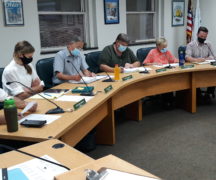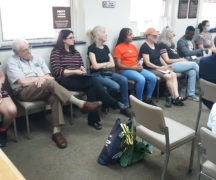By JAN LARSON McLAUGHLIN
BG Independent News
A former Bowling Green City Council member questioned the purpose and the potential impact of the zoning code update being considered by city officials.
“Personally, I think it is discrimination against older and lower income people who cannot afford the large homes, golf course homes on the west side, who are being told isn’t it nice you can just walk down the street to the carryout or other business,” said Joyce Kepke. “If it’s nice, why isn’t the whole town residential business – not just the older parts of town?”
Kepke, who served on City Council in the 1980s, voiced her concerns Monday evening as the zoning code update made its way to council’s review.
Her primary concern is the creation of “pedestrian residential” zoning that stretches from Poe to Napoleon roads on both sides of Main Street. The new zoning category allows for certain small businesses to locate in residential neighborhoods.
The neighborhoods affected include large historic homes and smaller modest homes.
“They are the homes of many of our older residents and members of our community that cannot afford homes on the golf course or in the housing areas west of town,” Kepke said. “When these homes were purchased, the people who live there now believed they were buying into residential neighborhoods and that our zoning laws protected their neighborhoods.”
“Now you are proposing to take away that protection,” she said.
Kepke questioned what type of businesses will be permitted – a carryout, law office, computer business, beauty parlor, neighborhood grocery?
She questioned the rationale of taking away housing protections at a time when the city has a shortage of low-income and mid-income housing.
“Our economic development people have told us that,” Kepke said. “A new homeowner or first-time homeowner already has difficulty finding a home to buy. And now you are creating a district that is no longer protected as a residential area. A new owner – and owners that have lived in this area for years – can suddenly find themselves with a business next door.”
Kepke acknowledged that some businesses, like a dry cleaner and carryout, already exist in the residential areas. But the people who moved into houses near those businesses knew about them prior to buying their homes.
“And when you go to sell your nice neighborhood residence, your property is now next to a business,” she said, predicting that property values will go down. “You can’t tell me that someone looking for a new home will find that desirable.”
Kepke asked City Council to review the proposed zoning updates and how they fit into the mission of a zoning code.
“I believe a big part of the mission of a zoning code is to give new owners and long-time owners confidence that the city will protect their property values,” no matter where they live in town, she said.
“Who asked for this change to be made? I am sure it wasn’t the people who have homes in this area,” Kepke said. “I submit to you that the business that you have hired to redo the zoning code does not live in Bowling Green, does not understand the difficulties of protecting property values in a college town, and it is your duty to make sure that what they have proposed really fits our community.”
Bob McOmber, president of the city Planning Commission and also a former City Council member, said the proposed “pedestrian residential” zoning radiates from the downtown business area. It may be expanded further in the city, but is initially a “logical transition” to the neighborhoods running adjacent to Main Street.
“It could be changed and expanded later on if it works out well,” McOmber said after Monday’s special meeting on the zoning code update.
City Council will continue studying the changes that were recommended by the planning commission.





